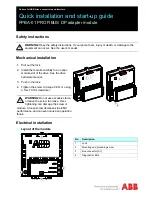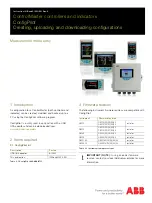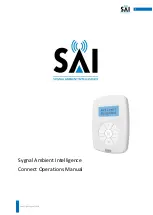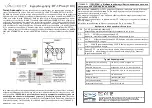
KGL Operating Manual – UA 412 S
2019-01-14
/
115 122
defrost times (menu 3-2) is, e.g. 48 hours, the delay time for the
alarm must be set at
No Defrost
least 1 hour greater, i.e. 49 hours.
11.1.3 Alarm due to sensor fault
If a sensor fault or sensor short-circuit is detected by the electronics, an alarm is tripped after expiry of the
specified delay time (menu 6-2-3).
Alarms due to sensor fault are always tripped for sensors that are indispensable for control functions.
In the case of optional sensors, a sensor fault only signals an alarm if these sensors have not been
removed from the monitoring by a sensor scan (menu 6-1).
11.1.4 Alarm suppression of the sensor fault alarm during a defrost
During a defrost, the evaporator sensors in particular can become do hot that their temperature is outside the
limits of the temperature recording of the case controller. The sensor fault alarm is suppressed during the
defrost in order to prevent false alarms.
Thereby, the following conditions are applicable:
A fault sensor alarm that was already present before the defrost will NOT be suppressed.
During any possibly parametrised drip time, sensor fault alarm signalling delayed by the delay time
takes place again.
A sensor fault that occurred during the defrost and persists beyond the defrost generates an alarm after
expiry of the delay time.
The sensor fault alarm suppression is used for all types of defrost (internal defrost, external defrost,
manual defrost and master / slave defrost). In the case of internal and manual defrost, the sensor fault
alarm suppression always goes beyond the complete safe defrost time even if the defrost was already
previously ended.
It should be noted that the alarm signalling of a sensor fault is extended in the worst case. The
longest possible delay would be ( 2 * T sensor fault delay ) + T defrost
If the delay time for the sensor fault alarm is set to zero minutes, there is no alarm suppression and the
alarm is generated immediately following detection of the sensor fault. This setting is not recommended
for the continuous operation of the controller!
11.1.5 Alarm due to hardware problems
An alarm is signalled without delay if hardware problems are detected by the electronics. The following
malfunctions are detected:
Temperature measurement
General faults
Setpoint loss (memory problems)
Time / date
First start
The priority for the transmission of the alarm results from the controller priority and the type of the alarm.
11.1.6 Restart








































